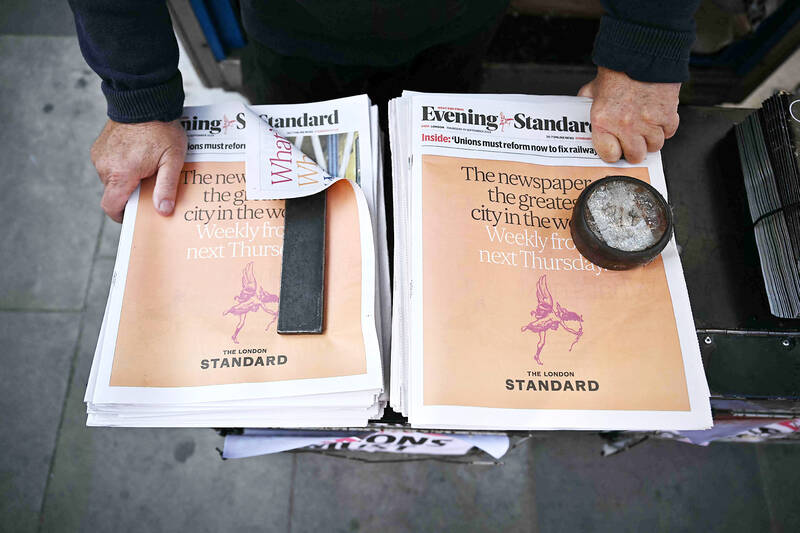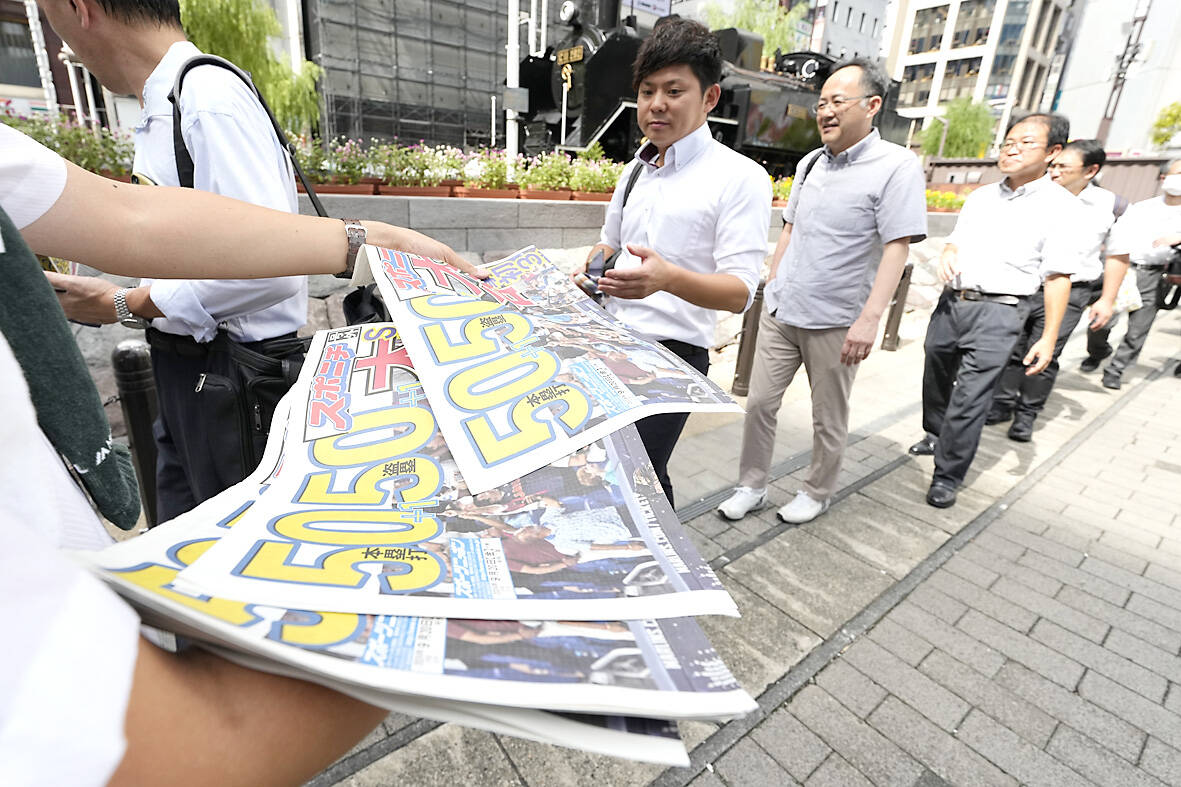From disinformation campaigns to soaring skepticism, plummeting trust and economic slumps, the global media landscape has been hit with blow after blow.
World News Day, taking place today with the support of hundreds of organizations, aims to raise awareness about the challenges endangering the hard-pressed industry.
‘BROKEN BUSINESS MODEL’

Photo: AFP
In 2022, UNESCO warned that “the business model of the news media is broken.”
Advertising revenue — the lifeline of news publications — has dried up in recent years, with Internet giants such as Google and Facebook owner Meta soaking up half of that spending, the report said.
Meta, Amazon and Google’s parent company Alphabet alone account for 44 percent of global ad spend, while only 25 percent goes to traditional media organizations, according to a study by the World Advertising Research Center.

Photo: AFP
Platforms like Facebook “are now explicitly deprioritizing news and political content,” the Reuters Institute’s 2024 Digital News Report pointed out.
Traffic from social to news sites has sharply declined as a result, causing a drop in revenue.
Few are keen to pay for news. Only 17 percent of people polled across 20 wealthy countries said they had online news subscriptions last year.

Photo: AP
Such trends, leading to rising costs, have resulted in “layoffs, closures and other cuts” in media organizations around the world, the study found.
ERODING TRUST
Public trust in the media has increasingly eroded in recent years. Only four in 10 respondents said they trusted news most of the time, the Reuters Institute reported. Meanwhile, young people are relying more on influencers and content creators than newspapers to stay informed.
For them, video is king, with the study citing the influence of TikTok and YouTube stars such as American Vitus Spehar and Frenchman Hugo Travers, known for his channel HugoDecrypte.
GROWING DISINFORMATION
The advent of artificial intelligence (AI) has renewed concerns about disinformation — rife on social platforms — as the tool can generate convincing text and images.
In the US, partisan Web sites masquerading as media outlets now outnumber American newspaper sites, the research group NewsGuard, which tracks misinformation, said in June.
“Pink slime” outlets — politically motivated Web sites that present themselves as independent local news outlets — are largely powered by AI. This appears to be an effort to sway political beliefs ahead of the US election.
As part of a national crackdown on disinformation, Brazil’s Supreme Court suspended access to Elon Musk’s X, formerly known as Twitter.
The court accused the social media platform of refusing to remove accounts charged with spreading fake news, and flouting other judicial rulings.
“Eradicating disinformation seems impossible, but things can be implemented,” Reporters Without Borders (RSF) editorial director Anne Bocande said.
Platforms can bolster regulation and create news reliability indicators, like RSF’s Journalism Trust Initiative, Bocande said.
ALARMING NEW PLAYER
AI has pushed news media into unchartered territory.
US streaming platform Peacock introduced AI-generated custom match reports during the Paris Olympics this year, read with the voice of sports commentator Al Michaels — fueling fears AI could replace journalists. Despite these concerns, German media giant Axel Springer has decided to bet on AI while refocusing on its core news activities.
At its roster, which includes Politico, the Bild tabloid, Business Insider and Die Welt daily, AI will focus on menial production tasks so journalists can dedicate their time to reporting and securing scoops.
In a bid to profit from the technology’s rise, the German publisher as well as The Associated Press and The Financial Times signed content partnerships with start-up OpenAI. But the Microsoft-backed firm is also caught in a major lawsuit with The New York Times over copyright violations.
‘QUIET REPRESSION’
With journalists frequently jailed, killed and attacked worldwide, “repression is a major issue,” said RSF’s Bocande. A total of 584 journalists are languishing behind bars because of their work — with China, Belarus and Myanmar the world’s most prolific jailers of reporters.
The war in Gaza sparked by Palestinian militant group Hamas’s Oct. 7 attack on Israel has already left a “terrible” mark on press freedom, Bocande added.
More than 130 journalists have been killed by Israeli airstrikes since Oct. 7, including 32 while “in the exercise of their duties.”
She said a “quiet repression” campaign is underway in countries around the world, including in democracies — with investigative journalism hampered by fresh laws on national security.

That US assistance was a model for Taiwan’s spectacular development success was early recognized by policymakers and analysts. In a report to the US Congress for the fiscal year 1962, former President John F. Kennedy noted Taiwan’s “rapid economic growth,” was “producing a substantial net gain in living.” Kennedy had a stake in Taiwan’s achievements and the US’ official development assistance (ODA) in general: In September 1961, his entreaty to make the 1960s a “decade of development,” and an accompanying proposal for dedicated legislation to this end, had been formalized by congressional passage of the Foreign Assistance Act. Two

March 31 to April 6 On May 13, 1950, National Taiwan University Hospital otolaryngologist Su You-peng (蘇友鵬) was summoned to the director’s office. He thought someone had complained about him practicing the violin at night, but when he entered the room, he knew something was terribly wrong. He saw several burly men who appeared to be government secret agents, and three other resident doctors: internist Hsu Chiang (許強), dermatologist Hu Pao-chen (胡寶珍) and ophthalmologist Hu Hsin-lin (胡鑫麟). They were handcuffed, herded onto two jeeps and taken to the Secrecy Bureau (保密局) for questioning. Su was still in his doctor’s robes at

Last week the Democratic Progressive Party (DPP) said that the budget cuts voted for by the China-aligned parties in the legislature, are intended to force the DPP to hike electricity rates. The public would then blame it for the rate hike. It’s fairly clear that the first part of that is correct. Slashing the budget of state-run Taiwan Power Co (Taipower, 台電) is a move intended to cause discontent with the DPP when electricity rates go up. Taipower’s debt, NT$422.9 billion (US$12.78 billion), is one of the numerous permanent crises created by the nation’s construction-industrial state and the developmentalist mentality it

Experts say that the devastating earthquake in Myanmar on Friday was likely the strongest to hit the country in decades, with disaster modeling suggesting thousands could be dead. Automatic assessments from the US Geological Survey (USGS) said the shallow 7.7-magnitude quake northwest of the central Myanmar city of Sagaing triggered a red alert for shaking-related fatalities and economic losses. “High casualties and extensive damage are probable and the disaster is likely widespread,” it said, locating the epicentre near the central Myanmar city of Mandalay, home to more than a million people. Myanmar’s ruling junta said on Saturday morning that the number killed had